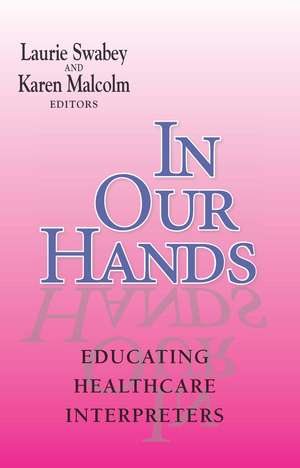In Our Hands: Educating Healthcare Interpreters: Interpreter Education, cartea 5
Editat de Laurie Swabey, Karen Malcolmen Limba Engleză Hardback – 28 feb 2012
Deaf Americans have identified healthcare as the most difficult setting in which to obtain a qualified interpreter. Yet, relatively little attention has been given to developing evidence-based resources and a standardized body of knowledge to educate healthcare interpreters. In Our Hands: Educating Healthcare Interpreters addresses these concerns by delineating the best practices for preparing interpreters to facilitate full access for deaf people in healthcare settings.
The first section of this volume begins with developing domains and competencies toward a teaching methodology for medical and mental health interpreters. The next chapter describes a discourse approach that relies on analyzing actual transcripts and recordings to train healthcare interpreters. Other chapters feature a model mental health interpreter training program in Alabama; using a Demand-Control Schema for experiential learning; the risk of vicarious trauma to interpreters; online educational opportunities; and interpreting for deaf health care professionals. The second section offers four perspectives on education, including healthcare literacy of the clients; the education of Deaf interpreters; the development of standards for spoken-language healthcare interpreters; and the perspectives of healthcare interpreter educators in Europe. The range and depth of In Our Hands takes significant strides in presenting educational opportunities that can enhance the critical services provided by healthcare interpreters to deaf clients.
The first section of this volume begins with developing domains and competencies toward a teaching methodology for medical and mental health interpreters. The next chapter describes a discourse approach that relies on analyzing actual transcripts and recordings to train healthcare interpreters. Other chapters feature a model mental health interpreter training program in Alabama; using a Demand-Control Schema for experiential learning; the risk of vicarious trauma to interpreters; online educational opportunities; and interpreting for deaf health care professionals. The second section offers four perspectives on education, including healthcare literacy of the clients; the education of Deaf interpreters; the development of standards for spoken-language healthcare interpreters; and the perspectives of healthcare interpreter educators in Europe. The range and depth of In Our Hands takes significant strides in presenting educational opportunities that can enhance the critical services provided by healthcare interpreters to deaf clients.
Preț: 347.55 lei
Preț vechi: 433.55 lei
-20% Nou
Puncte Express: 521
Preț estimativ în valută:
66.52€ • 72.28$ • 55.92£
66.52€ • 72.28$ • 55.92£
Carte indisponibilă temporar
Doresc să fiu notificat când acest titlu va fi disponibil:
Se trimite...
Preluare comenzi: 021 569.72.76
Specificații
ISBN-13: 9781563685217
ISBN-10: 1563685213
Pagini: 272
Ilustrații: 2 tables, 8 figures
Dimensiuni: 152 x 229 x 23 mm
Greutate: 0.59 kg
Ediția:1st Edition
Editura: Gallaudet University Press
Colecția Gallaudet University Press
Seria Interpreter Education
ISBN-10: 1563685213
Pagini: 272
Ilustrații: 2 tables, 8 figures
Dimensiuni: 152 x 229 x 23 mm
Greutate: 0.59 kg
Ediția:1st Edition
Editura: Gallaudet University Press
Colecția Gallaudet University Press
Seria Interpreter Education
Notă biografică
Laurie Swabey is Professor of Interpreting, St. Catherine University, St. Paul, MN.
Karen Malcolm, former Instructor/Coordinator, Department of Sign Language Interpreting, Douglas College, New Westminster, Canada, specializes in interpreting in medical and mental health settings.
Karen Malcolm, former Instructor/Coordinator, Department of Sign Language Interpreting, Douglas College, New Westminster, Canada, specializes in interpreting in medical and mental health settings.
Descriere
This study offers evidence-based resources and a standardized body of knowledge to delineate the best practices for preparing interpreters to facilitate full access for deaf people in healthcare settings.







